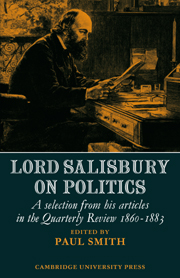Book contents
- Frontmatter
- Contents
- Preface
- List of abbreviations
- Editor's introduction
- Bibliographical note
- ‘The Budget and the Reform Bill’ (April 1860)
- ‘The House of Commons’ (July 1864)
- ‘The Reform Bill’ (April 1866)
- ‘The Change of Ministry’ (July 1866)
- ‘The Conservative Surrender’ (October 1867)
- ‘The Programme of the Radicals’ (October 1873)
- ‘Disintegration’ (October 1883)
- Index
- Cambridge Studies in the History and Theory of Politics
‘The Budget and the Reform Bill’ (April 1860)
Published online by Cambridge University Press: 06 July 2010
- Frontmatter
- Contents
- Preface
- List of abbreviations
- Editor's introduction
- Bibliographical note
- ‘The Budget and the Reform Bill’ (April 1860)
- ‘The House of Commons’ (July 1864)
- ‘The Reform Bill’ (April 1866)
- ‘The Change of Ministry’ (July 1866)
- ‘The Conservative Surrender’ (October 1867)
- ‘The Programme of the Radicals’ (October 1873)
- ‘Disintegration’ (October 1883)
- Index
- Cambridge Studies in the History and Theory of Politics
Summary
INTRODUCTORY NOTE
Lord robert cecil's first Quarterly article establishes at once his major preoccupations: with the threat posed by the development of the class struggle and the advance of ‘democracy’, with the corrosive effects of the financial tenets and idealistic pacifism of the Manchester school upon the nation's capacity to maintain its international position, and with the failure of the Conservative party under Derby and Disraeli adequately to uphold Conservative principles. It centres upon the chief domestic political topics of the spring of 1860, Gladstone's budget and Lord John Russell's Reform Bill, with a side glance at the menace supposedly offered to Britain by the designs of the emperor Napoleon III.
Lord Palmerston had become prime minister in June 1859, after the ejection of Derby's second ministry by that Whig-Liberal-Peelite-Radical amalgam that was ultimately to produce the Gladstonian Liberal party. The action of the Peelites, six of whom, Gladstone, Sidney Herbert, Cardwell, Newcastle, Argyll, and Elgin, entered Palmerston's cabinet, finally destroyed the longcherished hope of bringing them back to the Conservative fold, and dealt a severe blow to the prospects for Conservative revival, though the Conservative party in the Commons, about 300 strong after the 1859 general election, remained a substantial force
- Type
- Chapter
- Information
- Lord Salisbury on PoliticsA selection from his articles in the Quarterly Review, 1860-1883, pp. 111 - 158Publisher: Cambridge University PressPrint publication year: 1972

